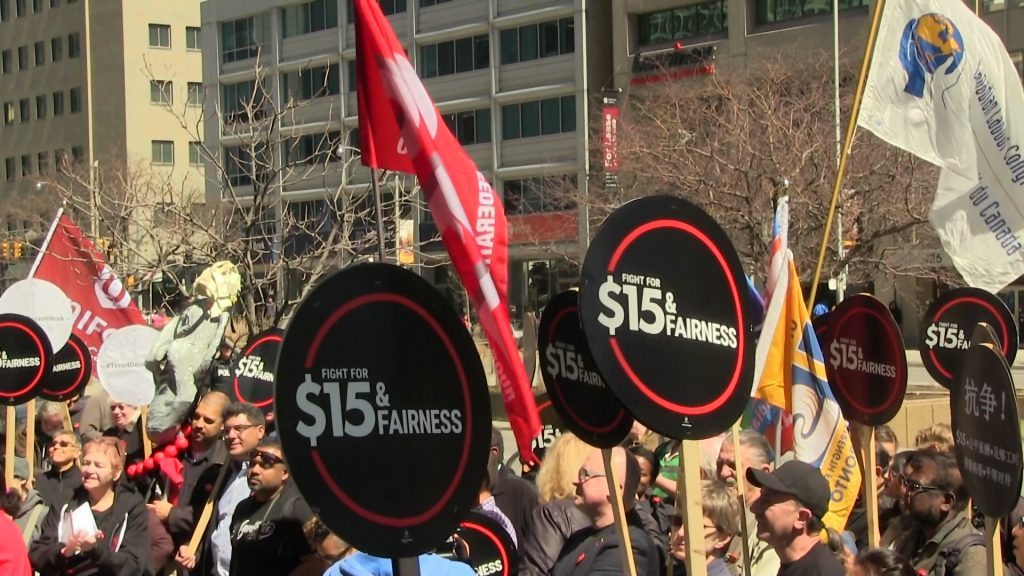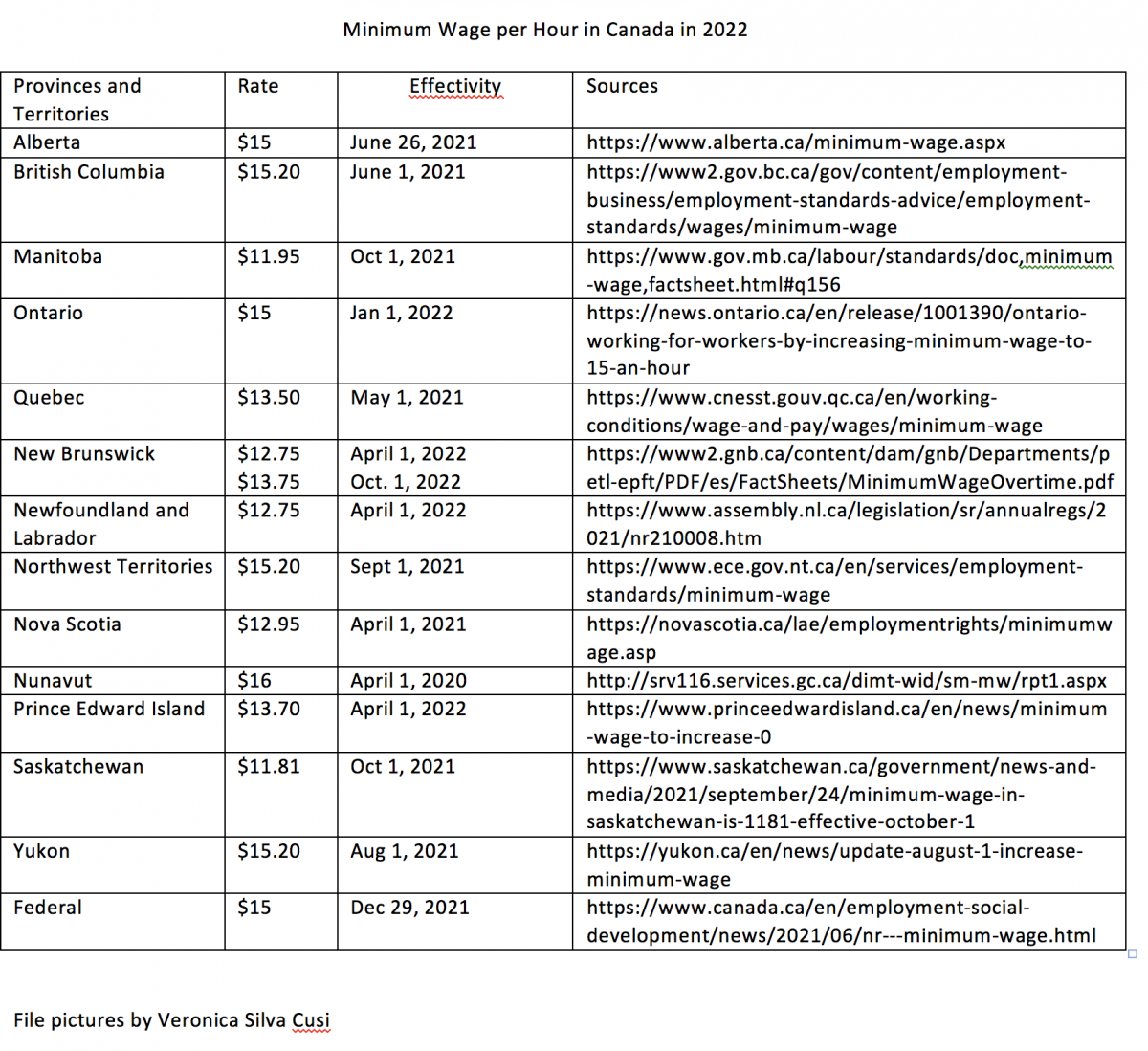Ontarians still short of living wage despite raise in minimum wage to $15/hour
Ontarians still short of living wage despite raise in minimum wage to $15/hour

Ontario workers, including kababayans, and labour groups have long been asking for minimum wage hike – from $14 then $15 per hour. Labour groups, in this 2015 file photo, demonstrate in front of the Ministry of Labour office in downtown Toronto to call for an increase minimum wage to $15. File photos by Veronica Silva Cusi
January 4, 2022
By Veronica Silva Cusi
The Philippine Reporter
LJI Reporter
Ontario has raised minimum wage to $15 per hour effective January 1. However, kababayans and labour groups say it is not enough to lift Ontarians out of poverty.
The wage increase is a reversal of a Progressive Conservative policy that froze minimum wage at $14 in 2018 when they took over Queen’s Park from the Liberals.
The increase of $0.65 in the paycheck is for general minimum wage workers. Other workers and students are getting a bigger pay bump and put them almost or on par with other workers in the province. Bartenders and alcohol servers will see pay bumped from $12.55 per hour while students below 18 years old will get $14.10 per hour from the previous $13.50.

JERRY DIAS,
Unifor National President
Unifor said in a statement that some Ontario workers, including retail grocery chain workers, will see a wage increase between 4 per cent and 4.5 per cent when combined with collective bargaining.
But while the increase is welcome, Unifor National President Jerry Dias said in a statement that “Ontario can and must do better to deliver living wages to all workers.”
A study by the Ontario Living Wage Network places living wage in the province to be at least $16.30 in Thunder Bay. The living wage in Toronto is pegged at $22.08 in November 2021.
A living wage is the rate at which a household can “meet its basic needs” based on the cost of living in the community, according to the definition in the National Living Wage Framework. It is based on two incomes in a family of four with a child in daycare.
Bayani Edades, a bakery worker and labour organizer, told The Philippine Reporter that the minimum wage of $15 is not enough, more so for migrants like Filipinos who have extended families back home.
In his case, even though his family of four have double income earners getting above the general minimum wage, it is still a struggle to make ends meet.

BAYANI EDADES, a bakery worker and labour organizer
Edades said that while any increase is good, it is not enough given the rate of inflation, which in November was at 4.7 per cent, and rent, and grocery expenses are increasing.
“Ito ay sampal sa mukha ng mga mangagawa, [The wage increase is a slap on the face of workers,” he added.
This year, landlords are allowed to increase rent by 1.2% after the city froze rent increase due to the pandemic. But even without the rent freeze, data from the City of Toronto show that rent in the city has consistently gone up in years. For example, a two-bedroom apartment was going for an average of $1,591 in 2020 compared to $1,492 in 2019. Utilities, including hydro, heat, and water, have also gone up in the city – to $125 from $120 in 2019 for a 2-bedroom.
According to Rentals.ca, a two-bedroom rental in Toronto was up 3.25% at $2,764 month-on-month and 11.09% year-on-year.
Then, there’s the expense of sending remittances back home.
Edades said that the immigrant community in Canada cannot ignore the extended families back home.
The struggles continue as Ontario moved into modified step 2 this month amid rising COVID-19 cases. The new restrictions include closing down restaurants and gyms for 21 days at least.
“This pandemic has shown that Canada is not a green pasture,” he added, as workers struggle to survive the pandemic in Canada while supporting families back home who are also in the thick of the pandemic.
History of campaign for $15
Edades, a member of Migrante Ontario, has been campaigning with other groups, such as Workers Action Centre, for $15 minimum wage.
The previous Liberal administration was able to bump minimum pay from $11 to $14 in 2018 with a promise to peg the rate to inflation.
Last November on the announcement of the Conservative’s plan to increase minimum wage, provincial Liberal Leader Steven Del Duca posted on Twitter: “Ontario Liberals raised the minimum wage while in government. Doug Ford cancelled the increase to help his ultra-rich friends. He’s only doing something for minimum wage workers now ahead of an election to save his own skin.”
The province’s official opposition, the NDP, is campaigning for $20 minimum wage if they win this year’s election.
Edades called for active participation from the working class to continue with the campaign for just wages and other supports, such as affordable housing.
Other provinces and federal
Ontario’s minimum wage puts it on par with Alberta and the federal government but behind British Columbia, Northwest Territories, Yukon, and Nunavut, which requires employers to pay the highest minimum wage in Canada at $16.

Minimum wage per Hour in Canada in 2022
Comments (0)